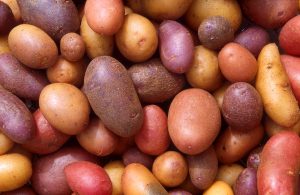Let’s take a look at the pesticides that can be found in non-organic foods in your grocery store, information taken from our AMCC courses:
Potatoes with pesticide genes
There is a potato variety resistant to insects on the market today: this genetically modified variety contains its own pesticide. Its genetic code contains a gene from a bacterium called bacillus thuringensis, or B.t., that allows the potato to produce a toxin that kills insects. Because these potatoes contain a pesticide, farmers are not required to use pesticides on the plants. Proponents of biotechnology claim that the toxin is deactivated by the stomach acids of humans and other mammals that eat it. Rats, mice and quail ate it and did not seem to suffer from any immediate toxic effects. However, the long-term effects of these foods have not been tested and it could be years beforeany side effects attributable to the poison can be identified.
contains its own pesticide. Its genetic code contains a gene from a bacterium called bacillus thuringensis, or B.t., that allows the potato to produce a toxin that kills insects. Because these potatoes contain a pesticide, farmers are not required to use pesticides on the plants. Proponents of biotechnology claim that the toxin is deactivated by the stomach acids of humans and other mammals that eat it. Rats, mice and quail ate it and did not seem to suffer from any immediate toxic effects. However, the long-term effects of these foods have not been tested and it could be years beforeany side effects attributable to the poison can be identified.
Corn with pesticide genes
In Canada, corn and its derivatives (starch, syrup, etc.) are used in more than 25% of processed foods. A maize variety has also been modified with bacillus thuringensis (B.t.) to protect it from insects. Given the widespread use of corn in food, any side effects could prove disastrous. Many scientists fear that potatoes and corn that contain the bacillus could cause allergies in some people and even poisoning in those taking antacids or ulcer medications.
Scorpion toxin on crops
Another product of concern currently being tested in southern Ontario is a genetically engineered insect virus to which the scorpion toxin gene has been added. Sprayed on vegetables, this genetically engineered virus becomes extremely effective in the extermination of insects and their predators, as well as insects responsible for pollination. Its possible effects on cuts and open wounds are of concern. Moreover, if this gene enters the human chromosomes, it could cause very serious nervous diseases or autoimmune disorders. A virus carrying this scorpion toxin gene could also become a terrible parasite.
Solution? Eat organic!
Question from a AMCC student
In our course 122, Vital Hygiene, we find a sentence that suggests that organic food contains pesticides. One of our somewhat distraught students therefore came to her tutor (Dr. Laure, at the time) and asked – by email of course: “did I understand correctly? Pesticides in organic food ?”
And Dr. Laure to answer:
“Unfortunately, some studies sometimes find traces of pesticides in so-called organic foods. This is obviously much less common than in non-organic crops, but it does happen. The explanation lies in the fact that the crops are outdoors and with wind, rain etc. the elements are disseminated which can lead to the contamination of a neighboring field. It is the same with GMO crops. However, if this is information to be aware of, remember that organic farming is much healthier and much safer in 99% of cases.”
There you go, now you have the whole truth!
If you liked this article, you might also enjoy:




Leave a Reply